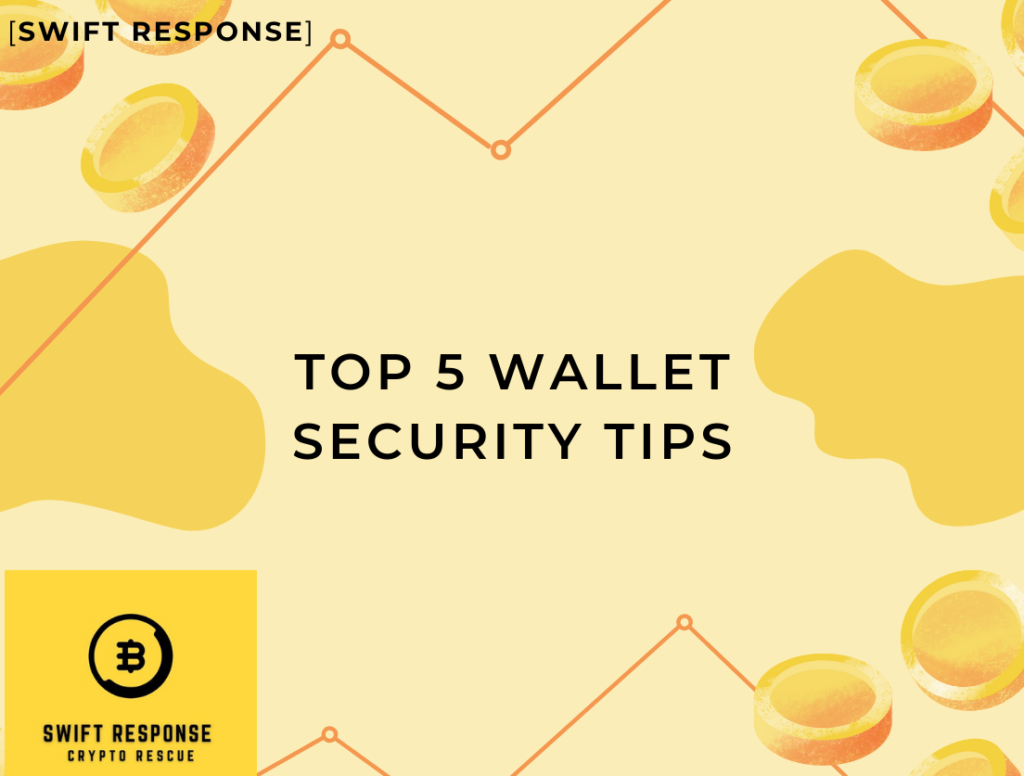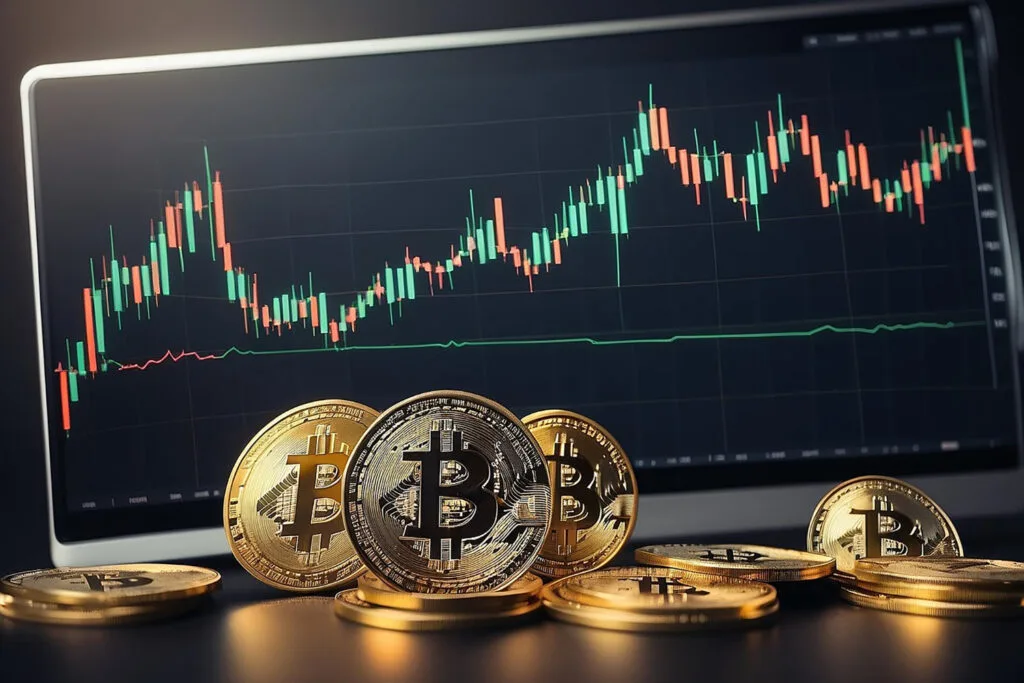Wallet Security Tips- Top 5 tips to Stay Safe


Cryptocurrency provides a unique, decentralized method of managing assets. Although it is a great tool, it does come with some unique risks. Cybercriminals, scammers and fraudsters are attracted to cryptocurrencies because they are digital. To investors, choosing the right investments is as important to them as protecting their assets.
This article dives into the Security Tips for Crypto Investors. It offers actionable insights that will protect your digital asset.
1. Use Secure Cryptocurrency Accounts
A cryptocurrency wallet will allow you to manage and store your digital asset. The right wallet must be chosen and used securely.
Types and Designs of Wallets
- The Hot Wallets is a wallet that connects to the Internet and is ideal for frequent transactions. MetaMask (for example) and Trust Wallet, are two examples.
- Cold Wallets — Offline storage with maximum security. Ledger Nano X (and Trezor) are two examples.
Best practices for wallet Security
- Use Hardware Wallets. Cold wallets, which remain offline, are less susceptible to hackers. Store a majority of your crypto assets using a physical wallet.
- Enable Dual-Factor Verification (2FA) adds an extra level of security, by sending a verification code to your phone.
- Securing Your Private keys: Do not ever share your private key or recovery phrase. They should be stored in a safe place like a locked box or encrypted device.
- Update wallet software regularly. Keep your wallet application up-to-date in order to be protected against security vulnerabilities.
2. Be Cautious with Exchanges
Cryptocurrency markets are useful for trading, but are also prime targets to cyberattacks. Mt. Gox, Bitfinex and other exchange breaches are a good example of the need for security.
What to look for when choosing a safe exchange
- Reputation. Research the exchange’s past and read user reviews. Binance Coinbase Kraken, are reliable platforms.
- Security Options Look for exchanges which offer 2FA and cold storage for money, as well as insurance against hacks.
- Regulation Select platforms that operate in compliance with local regulations.
Best Use of Exchanges
- Never Store Your Funds On Exchanges. Hackers can easily access exchanges. After trading your assets, transfer them to a secured wallet.
- Withdrawal Whitelists. Restrict withdrawals by allowing only pre-approved wallet addresses.
- Monitor Account Activity Regularly review your account and look for any suspicious logins or changes.
3. Beware of Scams and Phishing Attacks
The crypto-world is filled with scams intended to trick investors and get them to reveal sensitive information or transfer funds to malicious parties. Phishing, Ponzi scams, fake wallets and impersonation are all common scams.
What to Look for in Scams
- Avoid Offers That Sound Too Good To Be True: Avoid schemes claiming guaranteed high returns or “get wealthy quick” opportunities.
- Unsolicited Mail: Be cautious about messages or emails offering investment advice or urging urgent action.
- False Websites Verify authenticity of websites and apps before entering credentials.
Phishing Attack Prevention
- Verify URLs Scammers will often use URLs resembling legitimate platforms. Verify all website addresses.
- Avoid Clicking Unknown Links. Before clicking, hover your mouse over links to see their destination.
- You Should Never Share Sensitive Details. No legitimate platform would ask for your recovery phrases or private keys.
- Verify Transactions
Double-check that the recipient’s wallet is correct before you send any money. Scammers might manipulate addresses or trick users into sending assets to an incorrect account.
4. Strengthen Your Account Security
Account security will protect you from unauthorised access. Weak passwords, and bad account practices may expose you significant risks.
Tips and Tricks for Securing Your Accounts
- Use Strong Unique Passwords. Make passwords at minimum 12 characters. They should include uppercase, lowercase letter, numbers and symbols. Avoid using one password across all platforms.
- Enable the Two-Factor Authentication (2FA).: Instead of SMS, use apps like Google Authenticator Authy.
- Don’t Use Public Wi Fi. Never log into crypto accounts on public Wi Fi networks. Hackers are able to easily intercept your data. Use a virtual-private network (VPN), for secure browsing.
- Monitor Accounts Regularly. Check for unusual activity such as unauthorized transactions and unrecognized accounts.
Tools to Manage Passwords
Consider using a secure password manager, such as LastPass Dashlane 1Password, to manage several accounts. These tools store, encrypt and protect your passwords reducing the possibility of human error.
5. Stay Informed and Vigilant
Security is a priority in the rapidly evolving cryptocurrency world. Being informed about new threats and good practices will allow you to stay ahead of the curve.
Stay Current with Security Practices
- Follow reputable news sites like CoinDesk CoinTelegraph CryptoSlate.
- Join online communities for investors, like Reddit forums, Telegram groups and more.
- Updates from wallet providers and exchanges should be reviewed regularly.
Educate yourself about crypto risks
Understand common crypto vulnerabilities, such as
- rug Pulls is a term used to describe projects that disappear with the money raised by investors.
- Smart contracts exploits: Bugs with smart contracts in decentralized application (dApps) can lead to funding losses.
Test first before you believe
Before investing into a new cryptocurrency platform or currency:
- Look at the whitepaper or team that is working on your project.
- Verify if the project is open-source.
- To minimize your risk, you can start by making a small trial transaction.
Bonus Tips for Maximum Security
- Multi-Signature Wallets
Multi-signature digital wallets add an extra layer of protection by requiring approval from a number of parties prior to executing a transaction. - Save Your Money
Store backups in multiple secure locations of your wallet private keys. These backups can be stored in different secure locations. - Consider Hardware Solutions
YubiKeys are a great option for those with high-value crypto holdings. These physical keys allow you to securely access your accounts. - Remain skeptical about New Technologies
Although innovation is at the core of cryptocurrency, not all new technology can be trusted. Be sure to thoroughly check out any platform or protocol you are considering using. - Monitor Your Portfolio
Regularly check your investments and make sure they are allocated properly.
Case Studies: Lessons from Real Incidents
Mt. Gox Hack, 2014
- A security breach caused the theft over 850,000 BTC.
- Lesson #1: Never store money on an exchange. Prioritise wallet security.
Ledger Information Leak (2020).
- Ledger, the wallet manufacturer, leaked information about its customers online.
- Lesson — Use anonymous emails and avoid sharing your personal information.
Ronin Bridge Exploit (2022)
- Hackers stole $600,000,000 from Axie Infinity Ronin Bridge.
- Lesson — Understand the risks of DeFi and avoid relying too heavily on any one protocol.
The Future of Crypto Security
As the cryptocurrency market matures, it is expected that security practices and technologies will improve. This will make the ecosystem more secure for investors. Key trends include
- decentralized identity solutions: secure management of identities on blockchain-based platform.
- Zero Knowledge Proofs : Enhancing privacy while reducing data exposure.
- AI Powered Detection Using Artificial Intelligence in Real Time to Identify and Prevent Cyber Threats
- Regulatory Improve. Clearer regulations might encourage exchanges or wallet providers to adopt stricter security standards.
Conclusion
Cryptocurrency investing comes with a lot of potential, but also carries a number of inherent risks. Investors of all levels should prioritize security. By following our top five security tips, including using secure wallets, selecting reliable exchanges to avoid scams, strengthening your account security, and remaining informed, you can significantly reduce risks associated with crypto investment.
A proactive and cautious approach will help to protect your assets as the crypto world continues to evolve. In the crypto space security is not an option. It’s a need.
